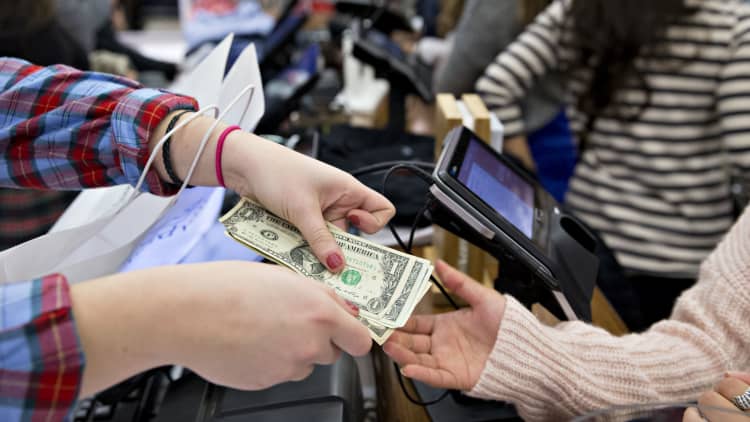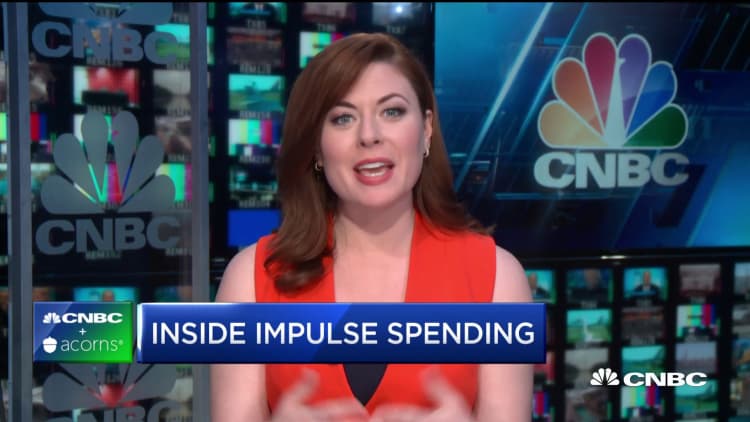
Women may get the rap as frivolous spenders, but it turns out that men are just as likely as women to make impulse buys—and spend more when they do.
A new CNBC and Acorns study finds that while nearly 90% of both men and women sometimes make impulse purchases, nearly a quarter of men said they shelled out more than $100 the last time they made an impulse buy, compared to just 16% of women.
The Invest in You Spending Survey was conducted by CNBC and Acorns in partnership with SurveyMonkey from June 17–20. A diverse group of 2,803 Americans were polled across the country, ranging in ages from 18 to over 65. Of the total, 1,320 were men and 1,498 had a college or graduate degree.
"The stereotype of women as impulsive in their purchase decisions is an inaccurate one," says Ross Steinman, co-chair and professor in the psychology department at Widener University. "Impulse purchases are a result of consumer personality characteristics as well as a strategic placement of enticing stimuli in the shopping environment."
Whether it's a clothing item on sale, extra candy at the checkout counter or a round of drinks for friends at a bar, everyone has succumbed to the impulse purchase at one point or another.
Source: Invest in You Spending Survey
A small, occasional splurge is OK, but when impulse purchases turn into mindless spending, or when the impulse purchases are big-ticket items derailing your financial security, it's important to evaluate what's driving that behavior. Often, impulse purchases are a form of emotional spending, experts say.
The emotions associated with different people's spending vary. One person might spend to cheer themselves up after a bad day, while another might spend to celebrate a milestone. Regardless of the reasons for spending — or the gender of the spender — it's possible to curb the habit.

More from Invest in You:
Wealth manager: Budgets don't work—do this instead if you want to build wealth
Learn money and investing basics in less time than an episode of "The Office"
How much you'll need in retirement savings by age 30, 40, 50 and beyond
Follow these steps to curtail emotional spending and put an end to impulse buys that could be threatening your financial security. After all, the less spent on nonessential items means more money in your pocket for wise investing to build a much needed savings plan.
1. Keep a spending diary.
Just as you might track everything you eat for a week when dieting, writing down all your purchases for a period of time will give you greater insight into how you're spending your money.
In addition, record why you've made them and how you feel about them. "Just the act of writing it down makes you more mindful about how you're spending your money and makes you think more about it," says money coach Christine Luken, author of "Money Is Emotional: Prevent Your Heart from Hijacking Your Wallet."
2. Institute a waiting period.
Ask yourself before every purchase whether the item is a want or a need. Make a rule for yourself that you won't make spur-of-the-moment "want" purchases beyond a certain amount. Instead, write down or take a picture of the item.
Give yourself a waiting period of 24 to 48 hours before completing the purchase, and longer for larger purchases. That way, you're less likely to have buyers remorse for buying something that you didn't actually want in the first place, Luken says.

Hitting the shopping mall? Bring cash instead of credit cards. Using cash for purchases automatically limits the amount you can spend.
Plus, using cash has been shown to make you spend less. That's because simply swiping a card allows you to detach the transaction from its impact on your bank account, but physically handing over cash to buy something forces you to think about the purchase in a different way.
Just as important, skipping plastic allows you to avoid the trap of credit card debt that eats away at your ability to save monthly. It's expected that Americans will spend $122 billion on credit card interest in 2019, almost $10 billion more than they did in 2018, according to banking comparison site MagnifyMoney.com. The average APR on credit card accounts has risen 4 percentage points over the last five years and now stands at 16.86%, the Federal Reserve reports.
3. Beware of retail tricks.
Stores are set up to make people spend as much money as possible. For example, stores use Sale signs to create a sense of urgency around unnecessary purchases and pipe in music to put you in the mood to start spending. You're particularly susceptible to such strategies once you've started spending.
4. Leave your plastic at home.
"Once you've made the decision to spend money, you've opened the door to spontaneous spending," says Tom Corley, author of "Rich Habits: The Daily Success Habits of Wealthy Individuals." "So you buy a dress, and then you find yourself deciding to buy shoes to go with it. Be careful, when you make a purchase, not to follow it up with subsequent purchases you didn't plan on."
Cut down the urge even more by making a list before you go into the store, which will serve as a physical reminder of the items that you planned to purchase — and the items that you didn't.
You can do this via an app, such as AnyList or List Ease, but it may be even more effective if you write it down the old-fashioned way — with pen and paper.
"The act of writing something down causes people to reflect on it," says Widener University's Steinman. "This often leads to consumers to think more critically about their wants versus needs."

5. Eliminate the urge online.
Online retailers have gotten just as good at prompting spending as their brick-and-mortar counterparts. Make it harder for them by unsubscribing from retail email lists and deleting their apps from your phone.
"Online retailers utilize flash sales, unexpected promotions and limited-time offers to entice consumers to make unplanned purchases," Steinman says.
Make it harder for them by unsubscribing from retail email lists and deleting their apps from your phone.
"Store promotional emails are often triggers for spending," Steinman says. "It is equivalent to someone pleading with you every day to purchase something."
Opt out of storing your credit card information with online retailers. Just as using cash for in-store purchases helps remind your brain that you're spending money, the extra step of having to enter your information each time you make a purchase will serve as a reminder that every transaction costs you money.
6. Budget for it.
Create a spending plan that includes for a set amount of "fun money," a fund that you can use for more frivolous purchases without guilt. This is the money that's left over after you've already put some cash toward financial goals, such as saving for retirement, establishing an emergency fund and paying down debt.
"An impulse purchase can make you feel great if you can afford it!" says Samantha Barry, editor of Glamour and a member of the CNBC Financial Wellness Advisory Council. "You won't feel buyer's remorse down the line, and you'll be happy with your 'treat yourself' purchase in both the short- and long-term."

Check out One-third of Americans have cut their spending this year: Results from Invest in You Spending Survey conducted by CNBC and Acorns in partnership with SurveyMonkey
Disclosure: NBCUniversal and Comcast Ventures are investors in Acorns.





